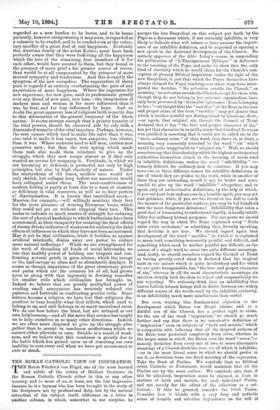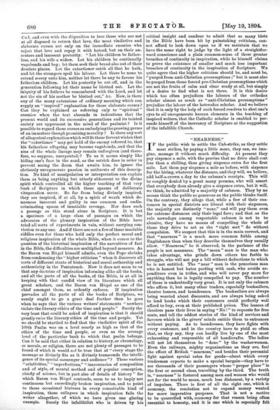THE ROMAN CATHOLIC VIEW OF INSPIRATION. T HE Baron Friedrich von
Hugel, one of the most learned and subtle of the critics of Biblical literature in the Roman Catholic Church either in this or any other country, and to most of us, at least, not the less impressive because he is a layman who has been brought to the study of the Scriptures not by professional duty, but by the natural attraction of the subject itself, addresses us a letter in another column, in which, somewhat to our surprise, he accepts the late Encyclical on this subject put forth by the Pope as a document which, if not certainly infallible, is very likely to indicate what will sobner or later assume the import- ance of an infallible definition, and be regarded as opening a new epoch in the doctrinal development of the Church. He entirely approves of the Abbe Loisy's course in suspending his publication of " L'Enseignement Biblique " in deference to the teaching of the Pope, and seeks to show that the only kind of elasticity which he would claim for the Church's con- ception of plenary Biblical inspiration under the light of the new Encyclical, is just that which the Popes themselves have always claimed for Papal teaching,—as when they have inter- preted the doctrine, "No salvation outside the Church," as meaning "no salvation outside the Church except for those who, though they do not belong to her external organisation, have only been prevented by invincible ignorance' from belonging to her; "—or taught that the " sacrifice " of the Mass in the true and proper sense of the term " sacrifice " may yet denote that which is neither painful nor distinguished by laborious effort ; —or again, that original sin, though the Council of Trent declared that it has "the true and proper character of sin," has yet that character in so mild a sense that Cardinal Newman was justified in asserting that it could not be called sin in the "mere ordinary sense" of that word, that there is, in short, a meaning very commonly attached to the word " sin " which would be quite inapplicable to "original sin." Well, we should ourselves say that this elasticity which the highest ecclesiastical authorities themselves attach to the meaning of words used in infallible definitions, makes the word " infallibility " ex- tremely difficult for ordinary men to construe. If you may have two or three different senses for infallible definitions, in one of which they are guides to the truth, while in another of them they are misleading, would it not be better and more candid to give up the word " infallible " altogether, and to speak only of authoritative definitions, by the help of which, if you use your best endeavours in a humble spirit, you may get real guidance, while, if you are too literal or too dull to catch the nuance of the particular context, you may be led blindfold into the most dangerous delusions ? Infallibility that takes a good deal of humouring to understand rightly, is hardly infalli- bility for ordinary human purposes. For our parts we should regard the way in which Pio Nono explained away " Nulla salus extra ecclesiam," as admitting that, literally speaking, that doctrine is not true. We should regard again that development of the word " sacrifice " in which it is explained to mean both something necessarily painful and difficult, and something which need be neither painful nor difficult, as the misuse of a single word to cover two quite different meanings. And, lastly, we should ourselves regard the Council of Trent as having greatly erred when it declared that the original taint in our nature which is quite involuntary and for which we are quite irresponsible, has "the true and proper character of sin," whereas in all its most characteristic meanings, sin involves strictly both freedom to reject and responsibility for not rejecting. We seriously think that an infallibility that leaves fallible human beings still in doubt between two widely different senses of the words used by the infallible authority, is an infallibility much more mischievous than useful.
But even waiving this fundamental objection to the development which Baron von Hugel claims, and, as a dutiful son of the Church, has a perfect right to claim, for the use of the word "inspiration," we should go much farther and say that there is no conceivable definition of " inspiration " even on subjects of "faith and morals," which is compatible with believing that all the inspired authors of the Bible were protected completely from error, whether in the larger sense in which the Baron uses the word " error,"— namely, deviation from every one of two or more alternative meanings of a Church doctrine, some one of which is infallible, —or in the more literal sense in which we should prefer to use it, as deviation from one fixed meaning of the expression. Take the Book of Psalms. We conclude that no Biblical critic, Catholic or Protestant, would maintain that all the Psalms are by the same author. We conclude also that, if this be admitted, inspiration must be claimed, at least in matters of faith and morals, for each individual Psalm, and not merely for the editor of the collection as a col- lection. If this be granted, consider the 109th Psalm. Consider how it blends with a very deep and pathetio sense of humble and absolute dependence on the will of Co I, and even with the disposition to love those who are not at all disposed to return that love, the most vindictive and elaborate curses not only on the immediate enemies who reject that love and repay it with hatred, but on their an- cestors and innocent posterity. "Let his children be father- less, and his wife a widow. Let his children be continually vagabonds and beg; let them seek their bread also out of their desolate places. Let the extortioner catch all that he hath, and let the strangers spoil his labour. Let there be none to extend mercy unto him, neither let there be any to favour his fatherless children. Let his posterity be cut off, and in the generation following let their name be blotted out. Let the iniquity of his fathers be remembered with the Lord, and let not the sin of his mother be blotted out," &c. Now, is there any of the many extensions of ordinary meaning which can supply an "inspired" explanation for these elaborate curses ? Can they be explained as referring only to " spiritual " enemies when the text abounds in indications that the present world and its successive generations and its tainted society are uppermost in the mind of the psalmist ? Is it possible to regard these curses as embodying thegrowing germs of an immature though promising morality ? Is there any sort of allegorical explanation which will fit these fervent wishes that the " extortioner " may get hold of the enemy referred to, that his fatherless offspring may become vagabonds, and that the sins of the whole lineage may remain unforgiven (and there- fore, we suppose, unrepented) ? To us it seems simply like hiding one's face in the sand, as the ostrich does in order to prevent seeing the doom that awaits him, to ignore the obviously unregenerate passion in outbursts of this descrip- tion. No kind of manipulation or interpretation can explain them as being anything but utterly abhorrent to the divine spirit which controlled all the higher teaching of that very book of Scripture in which these spasms of deliberate vituperation occur. So far from being divinely inspired, they are inspired, if at all, by a spirit of wrath which de- nounces innocent and guilty in one common and undis- criminating spasm of insatiable revenge. Nor does such a passage as this stand alone in Scripture. It is but a specimen of a large class of passages on which the advocates of the plenary inspiration of the Bible have tried all sorts of experiments in vain, without carrying con- viction to any one. And if there are not a few of these insoluble riddles even for those who hold only the perfect moral and religious inspiration of the whole Bible, when it comes to the question of the historical inspiration of the narratives of fact in the Bible, the difficulties are multiplied beyond measure. As the Baron von Hugel himself admits, even the Pope shrinks from condemning the " higher criticism" when it discovers all sorts of different strata of historical and moral authorship and authenticity in the Pentateuch. Now it does not seem to us that any doctrine of inspiration informing alike all the books, and all the parts of all the books, of the Bible, is at all in keeping with that candid view of its literature which all great scholars, and the Baron von Riigel as one of the chief amongst them, so ardently enforce. If inspiration pervades all the parts of all the books of Scripture, we surely ought to go a great deal further than he goes when he says that the various writers' statements "nowhere violate the literary ethics of the time and people." Surely the very least that could be asked of inspiration is that it should greatly raise the literary ethics of the time and people. Yet we should be startled to find that the vindictive spirit of the 109tb Psalm was on a level nearly as high as that of the ethics of the time and people, or even as the average level of the particular book to which that psalm belongs. Can it be said that either in relation to history, or chronology, or morals, or religion, there are not plenty of passages to be found of which it would not be true that at "every stage the message as divinely fits as it divinely transcends the intelli- gence of its special messenger and audience"? These various " relativities," "imperfections," "inaccuracies of composition and of style, of mental method and of popular conception, chiefly of science, but in part also of details of history" for which Baron von Hugel contends, seem to us to imply not continuous but exceedingly broken inspiration, and to point to those occasional hiatuses in every conceivable kind of Inspiration, those collapses in which inspiration fails the writer altogether, of which we have given one glaring example. Surely the infallibilist who is driven by his critical insight and candour to admit that so many blots in the Bible have been bit by painstaking criticism, can- not afford to look down upon us if we maintain that we have the same right to judge by the light of a straightfor- ward conscience and a plain common-sense of these greater breaches of continuity in inspiration, while he himself claims to prove the existence of smaller and much less important breaches of continuity in the inspiration of Scripture. We quite agree that the higher criticism should be, and must be, "purged from anti-Christian presumptions ;" but it must also be purged from those forced pro-Christian presumptions which are not the fruits of calm and clear study at all, but simply of a desire to find what is not there. It is this desire which too often prejudices the labours of the orthodox scholar almost as much as "anti-Christian presumptions" prejudice the labour of the heterodox scholar. And we believe that it is only by the help of such forced resolves to shut one's eyes to all unregenerate human elements in the teaching of inspired writers, that the Catholic scholar is enabled to per- suade himself of the inerrancy of Scripture at the suggestion of the infallible Church.







































 Previous page
Previous page